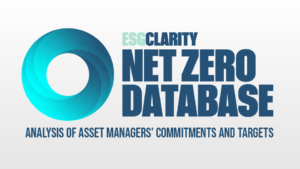There are plenty of barriers to progression for ethnic minorities in the financial services industry, but there are also plenty of potential solutions that firms need to consider, says Mona Patel, head of external communications at Metro Bank, in our latest Reboot video.
She urged firms to embark on more training for employees but also for individuals to find themselves a sponsor and make ambitions known among the senior leadership team so they can put them forward for projects.
ESG Clarity and Reboot have teamed up for this video interview series to celebrate ethnic minorities making a mark on the corporate world.
Please note ‘reboot.’ has rebranded to ‘Reboot’.
To see the full Reboot. series run by ESG Clarity click here
The full transcript of the video is below:
NK: Welcome back to our video series with Reboot, the initiative that allows us to hear from inspiring ethnic minorities, making a mark on the corporate world. Today I’m joined by Mona Patel head of external comms at Metro Bank. Thank you so much for coming in.
First of all, could you tell us a bit about your background, how you got to where you are today?
MP: I actually started off in the charity sector and spent 10 years lobbying and campaigning, and then I moved into financial services – a very different world to the charity sector. The charity sector is much more diverse. In financial services, I started out in investment management, so very male and very white. And as a young Asian woman, it was quite challenging but I had great supporters. My boss was absolutely fantastic. The organisation I was with itself was very diverse, and so I think that helped. It wasn’t always easy, and it was hard to understand when I was being challenged, if it was because I was young, because I was a woman or because I was an Asian, maybe it was a couple of those things, maybe all three. Who knows? But I think if you’re confident and self-assured and you believe in what you’re doing, I think you can get by. It’s not always easy to be like that, but I think you’ve got to have confidence and faith in yourself, and that really helps a lot.
NK: What would you say are some of the barriers to progression that ethnic minorities face in this industry? And perhaps you could talk about some of the challenges that you’ve overcome yourself?
MP: It’s quite a difficult question to answer because if we all knew what the barriers were, then we could find the solutions really easily. There are lots of barriers and they come from all different places. But fundamentally it’s down to the fact that institutionally and historically we haven’t had diversity. When I was growing up in the eighties and nineties, diversity, equity and inclusion weren’t words that anyone used, and now they are absolute buzzwords and everyone talks about them all the time.
We’ve come from a place where traditionally things like investment management were very white and very male dominated. They still are, but things are getting better. So there are barriers there. There are also barriers sometimes to people thinking that they can progress. And that’s there’s an old saying that says ‘if you can’t see it, you can’t be it’. If you’re a young person today from an ethnic minority starting out in financial services, you don’t necessarily have great role models and you can’t see people who look like you. So you don’t necessarily aspire or you think there’s a glass ceiling. You really need good role models. That’s one thing, but you also need to have a belief in yourself. You probably need to have a good mentor or a sponsor, someone who will promote you in the workplace – there is a difference between mentoring and sponsoring; there’s a huge focus on mentoring, but maybe there should be more of a focus on sponsoring where you’ve got someone who actively looks out for you in the workplace if you’re someone who wants to progress.
There are barriers around knowledge awareness. People don’t understand what unconscious biases are necessarily. I think if you don’t understand that, you can’t overcome it. People don’t realise that they have unconscious biases. I mean, I have unconscious biases. So do you. We all do. But if we understand them, we can work towards addressing them. There’s a lack of awareness, education and understanding for a lot of these things.
We need to put in place training to help people who want to aspire. There is lots of training available for everybody, but some people may lack training and confidence. They may lack training and the belief that they can progress. And we can do more to help people foster that self-belief in themselves. But also look at the pipeline, look at the training that’s required. So lots of problems, but also lots of potential solutions.
NK: Really interesting points there, thank you. You’ve given us an idea of what perhaps companies can be looking at to address these issues. What would you say to an individual that’s entering this industry that wants to push ahead? What would your top tips be?
MP: Find your champions, find your sponsors, find people who have your best interests at heart. Find senior people in your organisation who will who will sponsor you, and what that effectively means is they’re looking out for you so when a project comes up or an opportunity comes up, they think of you and they say, actually, this person would be good at that.
And get yourself known to the senior population. People are often reluctant to do that. And I think it’s a lot harder these days with hybrid working. Young people aren’t necessarily exposed to more senior people in their businesses because they’re not meeting them over the watercooler events. I think make yourself known to senior people, make it known that you have ambitions, and you want to progress and you want help.
If you need training, ask your manager for the training. I think you need to be proactive. Things aren’t going to come to you, things don’t fall in your lap. You have to go find them. You have to go chase them. So you need to help yourself. But I think finding those allies in the workplace that are looking out for you is a really great step.
NK: Fantastic. Well, thank you very much for sharing all your tips and advice with us and all of your background as well. It’s been great to listen to you today. Thank you.
MP: Thank you.








